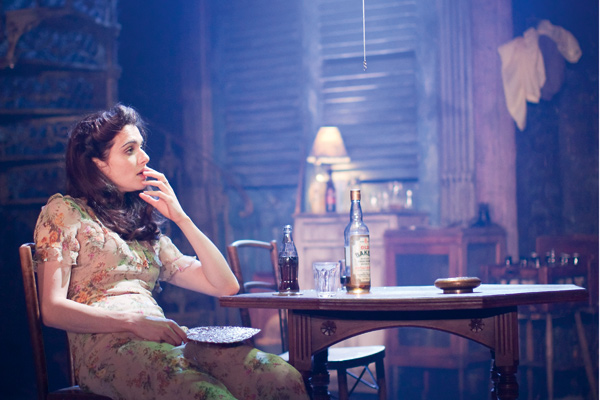Here’s a picture book that triumphantly exceeds the narrow bounds of the coffee-table genre. At £50 it’s hardly an impulse buy, but the photographs, covering Michael Grandage’s ten years in charge of the Donmar Warehouse, are sumptuously reproduced. And Grandage’s text is a revelation. It offers a fascinating glimpse into the mentality of a man who has established himself as London’s leading creator of Mercedes-class theatre. And it’s crammed with juicy gossip too.
Every Grandage production is rooted in two disciplines: performance and design. He aims to create a ‘forensic, beat-by-beat examination of a play’. The qualities he most prizes in performers are ‘honesty and depth’, and the ability to transmit ‘multiple thoughts in a single line or a single look’. He seems to relish actors with a volatile streak as well. One of his earliest Donmar productions, Caligula by Albert Camus, starred Michael Sheen as the psychotic Roman tyrant. While rehearsing with Peter Gayle, who was playing a court poet, Sheen suddenly ‘leapt high into the air across a table and wrestled him to the ground in a frenzied attack’.
An outstanding example of superior design was the 2009 production of A Streetcar Named Desire starring Rachel Weisz. Grandage praises the show’s style in unusual terms. It was ‘so assured in its execution and so breathtaking in its visual identity that it was barely commented on’. But of course. The final goal of design is not to look designed, and to disappear into the subject matter. ‘The audience watched the play as if for the first time, voyeuristically witnessing the sexual heat immediately in front of them.’
Grandage is big enough to admit his failures. Madame de Sade, an impenetrable French whiplash drama written by the Japanese suicidalist, Yukio Mishima, was greeted with indifference by the critics. ‘I got it in the neck for choosing a play they didn’t believe worth reviving.’
Peter Morgan’s play, Frost/Nixon, was a huge commercial success but it was blighted by ‘too many big egos’. Morgan himself proved ‘capable of the odd tantrum’, but he wasn’t alone in seeking to stamp his personality on the show. ‘A lot of people,’ Grandage says tactfully, ‘wanted to be in charge, and all of them were happy to pipe up about anything and everything all the time.’
Nixon was played by Frank Langella, ‘a complicated man,’ who lobbied to have the play’s title changed to Nixon/Frost. And he insisted that everyone call him ‘Mr President’ backstage. By the time the show reached Broadway, he and his co-star, Michael Sheen, were not on speaking terms. ‘Thank God we can’t remember pain,’ says Grandage, remembering it all too clearly himself.
Grandage appreciates writers who take a keen interest in the casting process. The playwright Patrick Marber, who attends every audition, indicates his dissatisfaction with an actor by quietly rising from his chair and climbing into a wardrobe. Harold Pinter liked to scrutinise actors rigorously. ‘Can he be innocent enough?’ he would ask. ‘Does she understand pain?’ The Donmar’s 2004 production of Old Times, starring Gina McKee and Jeremy Northam, was thrown into turmoil when Northam’s father died and he asked for permission to miss one or two preview performances. The company held a crisis meeting. ‘I’ve played the role before,’ announced Pinter, out of the blue. ‘And I’d be happy to reprise it.’ Everyone glanced at each other, unsure what to say. It was Pinter who broke the silence. ‘That pause was too long.’
‘I rather regret not jumping straight in,’ adds Grandage, ‘and making it happen.’ He’s not the only one.







Comments